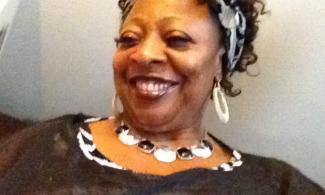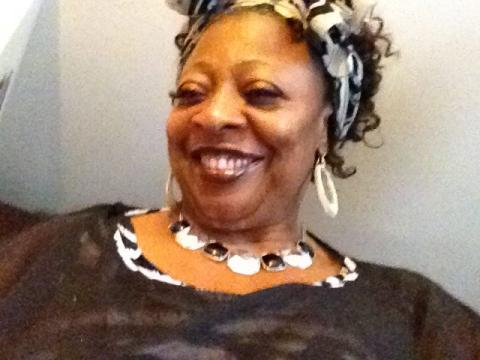
Born January 1, 1947 in Ishan, Edo State, it's been seven years since gospel singer super star Sonny Okosun died of colon cancer May 24, 2008 at Howard University Hospital, Washington DC, but the Nigerian musician continues to enjoy broad cultural resonance.

Ironically, the good news that brings peace began with bad news that brought brutality. The death of Sunny Okosun far from being a tragic loss, like water to a thirsty pilgrim and healing to a broken heart, his death is the reason for a colon cancer foundation set up in his name by his sister Stella Okosun.
Born January 1, 1947 in Ishan, Edo State, it's been seven years since gospel singer super star Sonny Okosun died of colon cancer May 24, 2008 at Howard University Hospital, Washington DC, but the Nigerian musician continues to enjoy broad cultural resonance.
Okosun had it all: talent, charisma, courage, wit, humor, energy, and a firm apostolic faith that allowed him to take the moral high ground, to preach unity, freedom, justice, above the level of politics.
His 1977 song “Fire in Soweto,” became a major international hit. He was featured in the anti-apartheid album Sun City. It is impossible to pay tribute to Okosun without the mention of the stirring, exhilarating “Fire in Soweto.” To Okosun, music was fundamentally about the future. His chief concern was pointing the way toward a positive new world that would rise phoenix-like from the ashes of oppression to freedom.
Okosun's passionate revolutionary songs: “ Papa's Land” (1976), “Power To The People” (1979), “3rd World” (1980), “Liberation” (1984), “African Soldiers” (1991), assert African dignity and equality as well as freedom and justice for black South Africans. Who could ever forget the impact of these songs for emotional and moral force they provided anti-apartheid foes in their struggle to overthrow apartheid?
“Fire in Soweto” reveals the dire poverty and political unrest. Five of his songs dedicated to apartheid leave a rich musical legacy that has only gained in impact with the passing of time. Okosun's songs underlying strength the way it weaves music to liberation of a people. It stitched into tight gospel fabric and political revolution.
I think it was in 2006 or 2007 a pastor friend of mine had invited me to his church in Virginia where Okosun was to preach as well as perform some of his songs. He looked warm, assured, and intense, Okosun was simply natural. He combined humility with independent vision, and the air of celebration on that particular occasion seemed to say “No Jesus No Life!”
The way Okosun made Nigerian Gospel music catch fire, it looked preordained. Seven years after his death, Okosun's gospel songs play in churches, weddings, and other special gospel events throughout the world. His songs show his outward display of concern and how unique and effective a communicator he was and, through his recordings, will always be.
For many of us, Okosun is more than just a musical icon. He is revered for his social conscience, spiritual mysticism, and political courage, and his songs continue to inspire disenfranchised people by offering them a promise of worldly salvation and divine redemption.
Indeed, the Indian Sufi master Hazrat Inayat Khan captures the essence of Okosun as musician-prophet and messenger when Khan describes the symbolic relationship between music and mysticism made possible through the power of music: “In fact, music excels religion, for music raises the soul of man, even higher than the so-called external form of religion. That is why in ancient times, the greatest prophets were great musicians.”
On this seventh anniversary of the death of the legend, I spoke to his sister Stella Okosun about the Sonny Okosun Colon Cancer Foundation. Stella is a registered nurse with more than 20 years experience in hospital, home health, and primary care. She is a case manager with Washington DC Department of Health (Healthy Start Program). A medical-surgical and critical care nurse, Stella is a graduate of Lagos University Teaching Hospital and Barnet General Hospital Hearts, England.
“My brother died of colon cancer without being aware that he had the disease. While receiving treatment at Howard University Hospital, Washington DC, he promised to sing for the cause to raise the awareness among black men especially Nigerian men.”
“To honor my brother's memory, after his demise in 2008, I founded the Sonny Okosun Colon Cancer Foundation in 2009. I launched the Nigerian branch in Lagos in 2010. The main objective of the foundation is to raise awareness of the disease among Nigerians through screening, information, and education. With the help of my professional colleagues both from the US and Nigeria, I organized health fair where people were screened for colorectal cancer, diabetes, and hypertension.”
“The health sector in Nigeria is as good as dead. I had a nasty experience in 2013 during a visit to the federal ministry of health. I had a scheduled appointment with an official of the ministry to solicit assistance and cooperation of the ministry for the foundation. I had to use the toilet, but to my utter chagrin, there was no toilet tissue and no water to flush. I complained to the official. He told me there was no money to purchase toilet tissue and with no water there was no way one could flush the toilet.”
“Because of corruption, it is very hard to penetrate both the federal and state governments in Nigeria to sell your vision and ideas. You have to bribe your way every step of the process for anyone to embrace your ideas that will lead to a change. Nigerian politicians prefer to run to India, US, Britain, for treatment than to improve the health care system at home. It is sad to note that there is no screening for colon cancer in Nigeria.”
“There is no available statistics on colorectal cancer related deaths in Nigeria. However, colorectal cancer is the third leading cause of cancer related deaths in the US among men and women. Routine test starting at age 40 can actually prevent many cases of the disease, or find it at an early stage. Because many people are not getting tested, only about 4 out of 10 are diagnosed at this early stage when treatment is most likely to be successful.”
“Regular screening can prevent colon cancer altogether by finding and removing certain types of polyps before they have the chance to turn into cancer. Risks factors for colon cancer includes life-style factors such as diet, weight, and exercise. A diet that is high in red meats such as beef, pork, lamb, or liver can increase colon cancer risk.”
“Diets high in vegetables, fruits, and whole grains have been linked with a decreased risk of colon cancer. Increasing activity may help reduce your risk. If you're very overweight, your risk of developing and dying from colon cancer is increased. Obesity raises the risk of colon cancer in both men and women, but the link seems to be stronger in men.”
“I see my brother's death as death that brings life. Through screening organized by the foundation, many lives have been saved from colon cancer. The foundation plans to build two permanent screening centers for colon cancer in Lagos and Abuja in 2016. I believe this is best way to honor my brother to preserve and prolong people's lives from preventable and curable disease like colon cancer.” Interested parties can reach Stella at (+1202) 664-7352 and at [email protected]